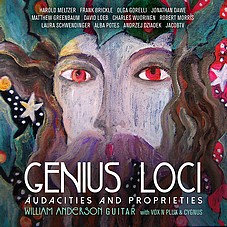
| |
CD ReviewsGenius Loci - New Recording by Guitarist William Anderson Guitarist William Anderson presents a new CD, Genius Loci, available as a digital download, released September 10, 2021. Anderson plays solo guitar on ten of the eighteen tracks. Most of the music is described as modernist (1955-1990s). In modernism each work creates its own world and it's adherents value absolute self reliance. This independence at its extreme required no audience for their compositions. This is heavy theory but fortunately the classical guitar is a fairly quiet instrument of six strings so this extreme theory leads to intriguing descriptions of very listenable music. The offer via email of a digital download of Genius Loci caught our attention. We had met William Anderson on February 3, 2004 when he performed at Old Dominion University with the new music ensemble Creo, headed by Andrey Kasparov. His performance was memorable: he played chamber and solo pieces by George Crumb, Lucio Bario, Peter Maxwell Davies and Steve Reich's Electric Counterpoint where he played live accompaniment with his ten pre-recorded guitar tracks and two bass tracks. On this new download there is nothing quite this radical but there are some exciting chamber ensemble pieces.
Anderson conducts Hail Wind (two movements) by David Loeb, written for an ensemble of eight guitarists (Sheer Pluck) originally written for a biwa (Japanese lute). The Moderato movement moves heavily, step-by-step as if the instruments are marching together. The Allegro movement has an Eastern feeling and is very percussive, exciting even, a massive conglomeration of strings that slim down to a single guitar, only to be accompanied by many deliberate slides over strings that come as it's about to end. This is followed by a somber movement by Anderson as composer and performer of his four-movement Variations on “Long Ago and Far Away”. In the second movement the pace quickens and the sound is more complex, almost tuneful with precise plucking of strings. The third is moody but becomes more tuneful and energetic. It is not until the fourth variation that we hear the original melody of Jerome Kern's Long Ago and Far Away (written for the movie Cover Girl and nominated for Best Song Oscar in 1944). Anderson paired his pieces with Hexadactyl by Charles Wourinen (1938-2020) because as Anderson says “they play the same sport.” Wourinen was a “key exemplar of uptown Manhatten high modernism.” Music so joyless that his late-in-life opera Brokeback Mountain was devastating to experience on DVD— no hope, no escape! This solo guitar piece is listenable as a sort of unhinged jazz riff. One of the longer pieces, the eleven-minute Après Vous (After You) by Robert Morris, was written for Anderson in 2003. “There is a French mood, a light, gentle quality” drawing on ancient compositional technique—”Canons that are decorated, elaborated, and sometimes submerged.” In another longer piece, the strange and intriguing Footfalls by Laura Schwendinger, we hear Fader and Anderson once again playing together, but this time as part of Cygnus, with flute, oboe, violin, cello and mandolin. The wispy, spidery opening sounds are engaging. The alarm sound that holds the center is briefly stated by a parade of solo instruments embracing noise—un-pitched sounds. All in service to Samuel Beckett's play Footfalls, Schwendinger's music captures the mood of Beckett's haunting and oddly musical ghost plays (Anderson's program notes). There are so many treasures here, so many lines of inquiry to pursue in what is an autobiography of a life devoted to music. It is a bridge between twentieth-century and twenty-first century guitar repertory. The program notes are absolutely essential to grasping the intent of the music he plays. Anderson has found a coherent way to make maximalism and minimalism work together. Horizontes, a vocal piece by Columbian woman composer Alba Potes, uses texts by Charles Ives and his aunt, translated into Spanish. Written in 2018, it came about by a “devilish scheme” that Anderson and Potes cooked-up together. Fader, classical guitar, Elizabeth Farnum, soprano and Anderson on tiple (Columbian folk guitar with twelve strings and four courses) are heard in music that is hauntingly beautiful while also being a bit unsettling. If contemporary guitar music is of interest to you, by all means pursue this album. There are several other good stories that a listener who downloads and reads the notes will find. You will find it an enthralling adventure without taking too great a risk. Available for $8.99 on Spotify and Apple Music. If you visit ttps://www.ravellorecords.com/catalog/rr8047/, on the banner you'll find links to stream and purchase as well as track listings and those essential program notes. Back to Top
|
 After that concert he gave us three CDs that we have since enjoyed again and again. One CD features Cygnus Ensemble, founded in New York City in 1968. Anderson and Oren Fader are the group's two guitarists. Here they play two movements from Genius Loci, the title piece written by Frank Brickle, who was Anderson's composition teacher in the 1990s. Anderson says that Brickle was redeploying sweet, pretty harmonies that were forbidden for a time in respectable music circles, years before Milton Babbit did the same. In this sweet, simple tune Anderson plays mandolin and Fader guitar with recorded clear, vivid sound.
After that concert he gave us three CDs that we have since enjoyed again and again. One CD features Cygnus Ensemble, founded in New York City in 1968. Anderson and Oren Fader are the group's two guitarists. Here they play two movements from Genius Loci, the title piece written by Frank Brickle, who was Anderson's composition teacher in the 1990s. Anderson says that Brickle was redeploying sweet, pretty harmonies that were forbidden for a time in respectable music circles, years before Milton Babbit did the same. In this sweet, simple tune Anderson plays mandolin and Fader guitar with recorded clear, vivid sound.